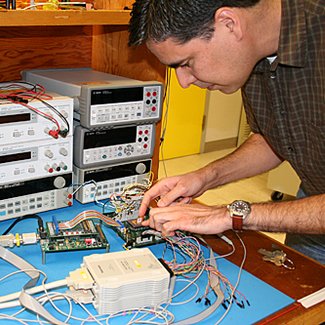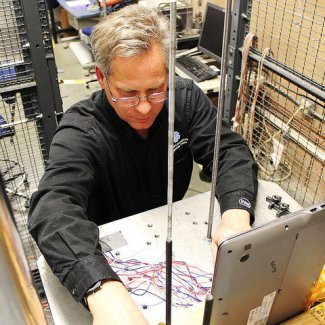
Electrical engineers are typically responsible for designing new methods to utilize electrical power to improve products, conduct detailed measurements for manufacturing, testing to ensure products meet regulation codes, investigating problems to find effective solutions, and collaborating with project managers on electrical production efforts.
Salary
How much does an electrical engineer make? According to the Bureau of Labor Statistics from May 2012, the 160,560 electrical engineers employed throughout the United States earn an annual average electrical engineer salary of $91,810, which is equivalent to a mean hourly wage of $44.14.
The bottom earning 10% of electrical engineers earn $56,490 or less, while the top 10% of electrical engineers earn $136,690 or more annually. Electrical engineers employed in communications equipment manufacturing earn a mean $90,870, the highest paid in the occupation are employed in oil and gas extraction for an average salary of $106,780. By far, the top-paying state for electrical engineering employment is California with an average $107,280 annually.
| State | Hourly Wage | Average Salary | Number of Jobs |
|---|---|---|---|
| Alabama | $43.19 | $89,830 | 4,020 |
| Alaska | $50.17 | $104,360 | 630 |
| Arizona | $46.83 | $97,410 | 4,610 |
| Arkansas | $34.66 | $72,090 | 620 |
| California | $51.57 | $107,280 | 24,110 |
| Colorado | $44.18 | $91,890 | 3,990 |
| Connecticut | $41.91 | $87,160 | 1,860 |
| Delaware | – | – | 670 |
| Florida | $41.15 | $85,590 | 7,270 |
| Georgia | $40.52 | $84,280 | 3,670 |
| Hawaii | $39.88 | $82,950 | 620 |
| Idaho | $46.02 | $95,720 | 1,070 |
| Illinois | $42.25 | $87,890 | 4,670 |
| Indiana | $39.11 | $81,340 | 2,680 |
| Iowa | $37.17 | $77,310 | 1,330 |
| Kansas | $40.13 | $83,470 | 1,810 |
| Kentucky | $38.00 | $79,040 | 1,130 |
| Louisiana | $45.02 | $93,650 | 1,080 |
| Maine | $38.02 | $79,090 | 420 |
| Maryland | $46.35 | $96,410 | 4,060 |
| Massachusetts | $48.92 | $101,750 | 7,520 |
| Michigan | $39.56 | $82,290 | 5,470 |
| Minnesota | $41.78 | $86,910 | 4,090 |
| Mississippi | $38.28 | $79,630 | 660 |
| Missouri | $42.04 | $87,440 | 3,280 |
| Montana | $34.84 | $72,470 | 490 |
| Nebraska | $38.45 | $79,970 | 790 |
| Nevada | $42.16 | $87,690 | 480 |
| New Hampshire | $46.14 | $95,960 | 1,180 |
| New Jersey | $43.96 | $91,440 | 3,810 |
| New Mexico | $42.98 | $89,390 | 780 |
| New York | $44.53 | $92,620 | 9,120 |
| North Carolina | $41.65 | $86,630 | 3,720 |
| North Dakota | $37.89 | $78,810 | 250 |
| Ohio | $37.60 | $78,220 | 5,520 |
| Oklahoma | $35.49 | $73,810 | 940 |
| Oregon | $43.96 | $91,430 | 1,750 |
| Pennsylvania | $41.36 | $86,020 | 5,900 |
| Rhode Island | $47.00 | $97,760 | 370 |
| South Carolina | $39.12 | $81,370 | 2,240 |
| South Dakota | $35.78 | $74,430 | 230 |
| Tennessee | $41.57 | $86,470 | 2,400 |
| Texas | $45.48 | $94,600 | 11,840 |
| Utah | $41.15 | $85,580 | 1,620 |
| Vermont | $39.55 | $82,270 | 470 |
| Virginia | $45.58 | $94,810 | 5,960 |
| Washington | $45.17 | $93,960 | 5,330 |
| West Virginia | $39.13 | $81,390 | 280 |
| Wisconsin | $37.14 | $77,250 | 3,030 |
| Wyoming | $33.19 | $69,040 | 230 |
| Data courtesy of U.S. Bureau of Labor Statistics | |||
Work Environment
The majority of electrical engineers, around 22 percent, are employed within engineering, architectural, and related services firms nationwide. Other electrical engineers work within electric power generation, electromedical manufacturing, control instruments manufacturing, and scientific research and development services.
Most electrical engineers work indoors within offices to conduct their research, but many will travel to various sites to observe a pieces of complex equipment firsthand. Electrical engineers often work full-time hours, though it is not uncommon for them to work long overtime hours in certain industries.
Job Outlook
Employment for electrical engineers is predicted to grow much slower than the national average for other professions at a rate of 6 percent, which will result in the creation of just 10,700 new jobs before 2020. While slight job growth is expected because of electrical engineers’ versatility at developing the advancing technologies, growth will be slowed considerably by the decline of the manufacturing sector that they are employed in. The largest amount of growth will mostly occur in computer systems design and wireless telecommunications to keep up with the powerful trend for mobile electronic devices.












I want to contact the one who is interest in professional Electrical Engineer and estimate their work where I have experience about 12 years in power and control systems.
In addition I live in California